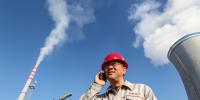China set for carbon pricing
As Australia moves to scrap its pioneering carbon-pricing scheme, China is expected to have seven pilot pricing systems in place no later than 2015, followed by a national scheme, according to a new survey from ANU.
The survey – a joint initiative between Crawford School’s Centre for Climate Economics and Policy and Beijing-based NGO China Carbon Forum – collected the opinions of 86 China-based carbon pricing experts.
The survey found strong confidence that China will introduce carbon-pricing mechanisms in coming years, that the price of emitting carbon will rise over time, and that China will have both a national emissions trading and a carbon tax by the end of the decade.
Study co-leader and Director of the Centre for Climate Change Economics and Policy, Associate Professor Frank Jotzo said that nationwide emissions trading was set to become a reality in China.
“This would quite possibly be in tandem with a carbon tax and would give a boost to China’s efforts to limit emissions growth and stop growth in coal use,” said Associate Professor Jotzo.
“If the world’s largest emitter embraces carbon pricing then this will send a strong signal the world over.
“A shift to market-based approaches to carbon control by the world’s largest emitter is a big deal, especially at a time when Australia is poised to renounce its carbon pricing scheme.
“It would be somewhat ironic if China, with its tradition of heavy-handed direct control of its industry, were to move to emissions pricing while traditional market economies, such as Australia and the United States, rely on more direct government involvement.
“This is the first time that we can put numbers to what people who are close to the action expect to happen,” he said.
The survey also indicates an expected combined Chinese price for emissions trading and carbon tax of RMB 70 ($12) per ton in 2020, rising sharply thereafter.
The large majority of experts surveyed were also confident that China will achieve or surpass its 2020 emissions intensity target, and almost all expect that new targets will be set for 2020 and 2025.
The report China Carbon Pricing Survey 2013 is available upon request.
This article originally appeared on the ANU College of Asia and the Pacific website.
Updated: 27 July 2024/Responsible Officer: Crawford Engagement/Page Contact: CAP Web Team













